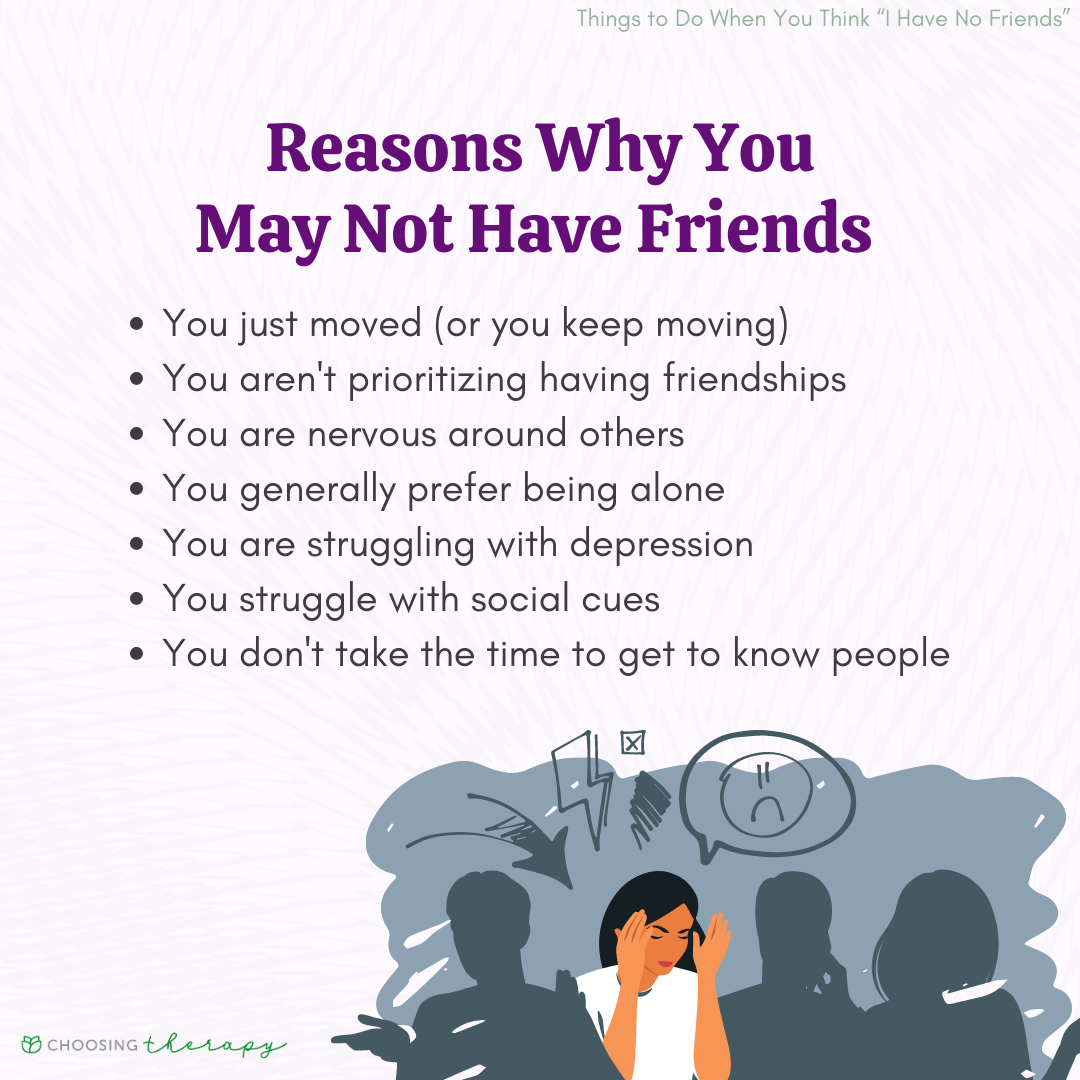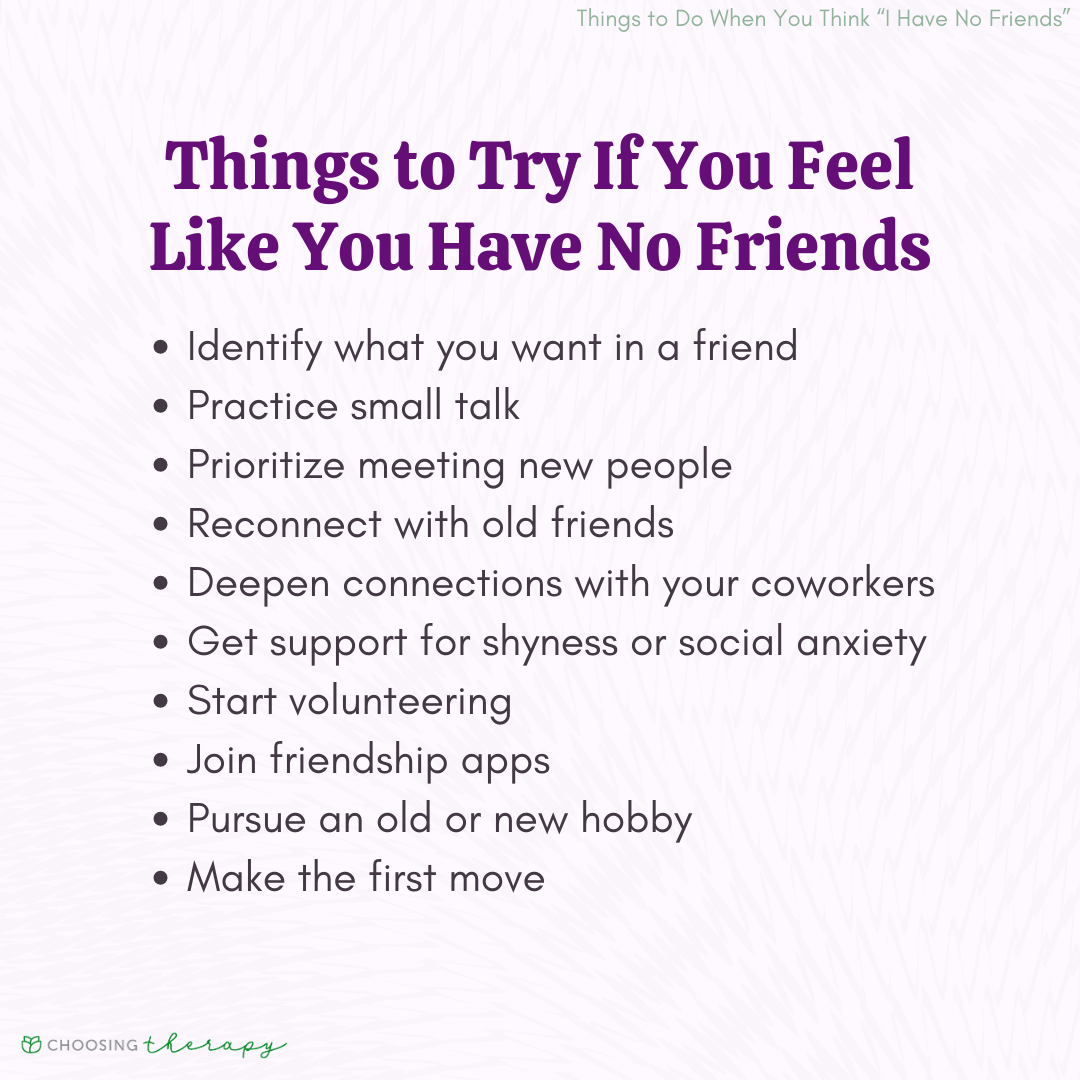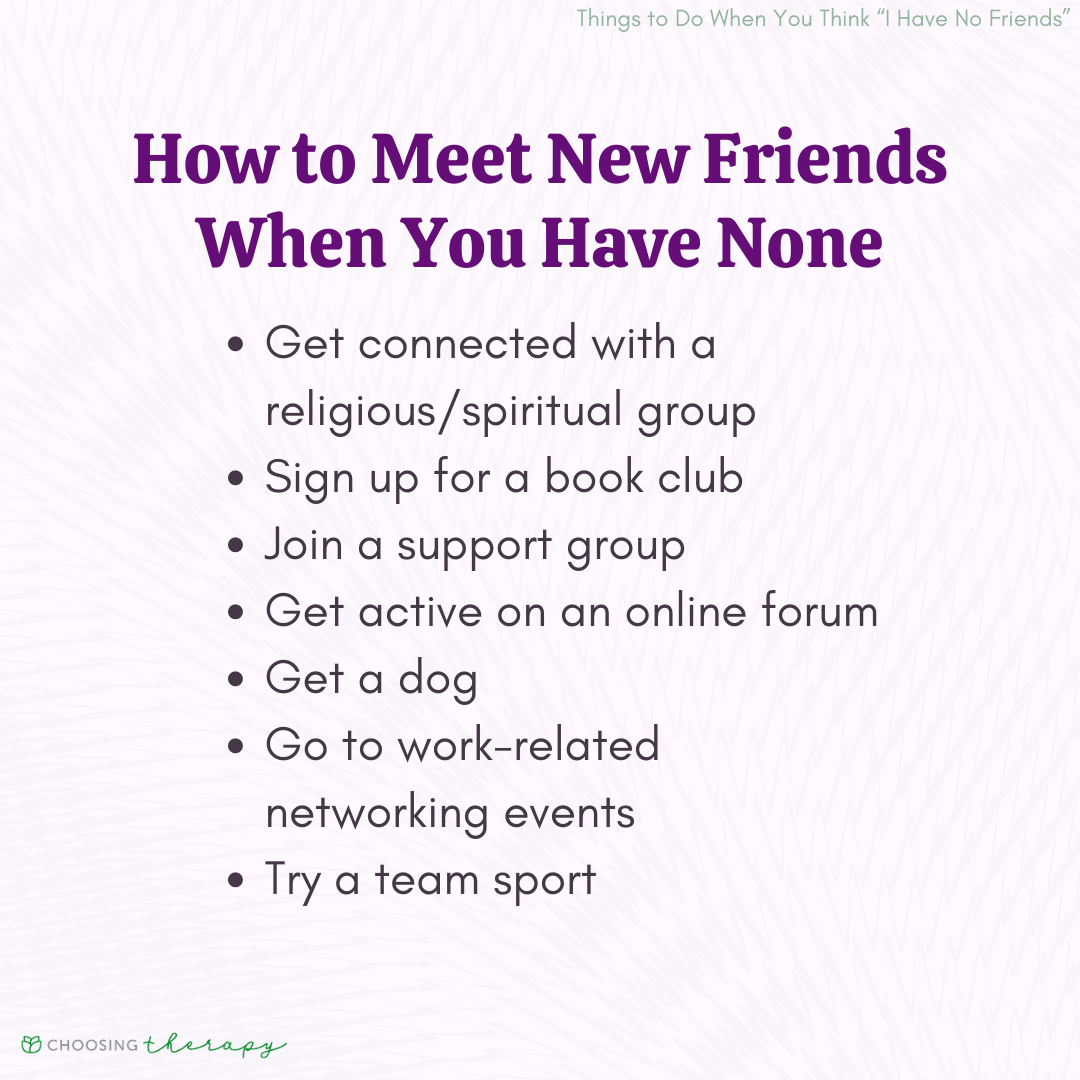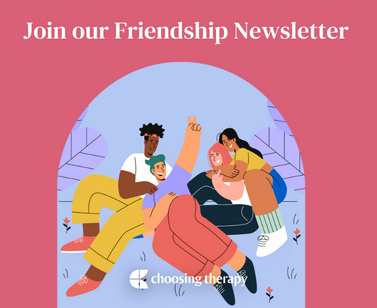It’s no secret that social connection closely coincides with emotional wellness. But if you feel like you don’t have any friends, you may experience sadness, loneliness, and anger. You might also wonder what exactly is contributing to this problem. Fortunately, no matter your circumstances, it is possible to make new friends or reconnect with old ones.
Do social situations make you feel uncomfortable? Therapy can help. BetterHelp has over 20,000 licensed therapists who provide convenient and affordable online therapy. BetterHelp starts at $65 per week. Take a Free Online Assessment and get matched with the right therapist for you.
Reasons Why You May Not Have Friends
Making and keeping friends isn’t passive. It requires active intention, effort, and vulnerability. These skills can be challenging, especially as we get older and busier. Many men have no real friends due to gender stereotypes. In addition, certain mental health issues, like depression, anxiety disorders, or post-traumatic stress disorder (PTSD), can impact how you relate to others.
Below are some reasons why you may not have friends:
- You just moved (or you keep moving): Relocating has its purpose, but it can be hard to “find your roots” when home keeps changing.
- You aren’t prioritizing having friendships: Friendships undeniably require effort. Other obligations like work, romantic relationships, or raising children can keep you so busy that you don’t feel you have enough time for your friends.
- You are nervous around others: Social anxiety disorder can make it challenging to connect with others because you feel preoccupied with how they might perceive you. This can cause withdrawal and avoidance patterns.
- You generally prefer being alone: Some people simply need more alone time to recharge (this is especially true for introverts). You may have some friends, but you tend to value depth and intimacy over casual conversation.
- You are struggling with depression: Depression can make it difficult to reach out and connect with others. Spending time with people may feel like a chore, and you may worry about being a burden to others.1
- You struggle with social cues: Friendships often require paying close attention to nonverbal cues and body language. If these are difficult for you, you may find it hard to connect well with others.
- You don’t take the time to get to know people: Friendship takes time to build, and it can be an investment of time and resources. One study found that it takes about 50 hours together to move from an acquaintance to a casual friend.2
Why It’s Important to Stay Social
Socialization matters for people of all ages. Research shows that people experience greater well-being when they indicate friendships as being important.3 Meaningful friends provide emotional support, and they can directly improve mental health. While it’s possible to be happy alone, we are naturally social creatures. Social isolation may contribute to symptoms of depression, touch starvation, and immense loneliness.
Below are benefits of having friends:
- Decreased stress: Being around your friends can reduce your stress levels. In addition, friends are also there to help you deal with challenging situations.
- Improved mood: Spending quality time with friends feels good. Even just grabbing coffee with someone can boost your mood for the rest of the day.
- Foster resilience: Good friends show up when you feel lost or down. This can help you better cope with adversity.
- Improve self-esteem: Friends can help build your confidence. A good friend will validate your feelings, celebrate your successes, and see the best in you.
- Motivation to be a good person: If you surround yourself with people who are positive influences, you might be more inclined to act in the same ways they do.
10 Things to Try If You Feel Like You Have No Friends
While it’s generally easy to make friends in childhood, adults often face more difficulty trying to connect with others and may feel like they can’t make friends. You may not have realized that you’ve drifted away from certain people. Or you’ve been so busy with work or family that you haven’t focused on spending time with friends. That said, there are many ways to find new friends, and it’s essential that you commit to the process without trying to rush things too quickly.
The following are ten things to try if you have no friends:
1. Identify What You Want in a Friend
No one friend can fulfill every need, but it may be helpful to consider what you desire in a friend right now. For example, if you’re looking for a hiking buddy, that relationship will probably look much different than if you’re looking for mom friends with young children. Consider the priorities and values that matter most to you as a starting point.
2. Practice Small Talk
If you struggle with feeling insecure around others, it’s important to practice social skills regularly. Make it a point to interact with your barista or the grocery store cashier, or your next-door neighbor (even if it feels awkward). Exposing yourself to these conversations can help you feel more confident as you search for new friends.
3. Prioritize Meeting New People
It’s crucial to embrace having a mindset where you consistently say yes to opportunities where you can meet new people. You will likely be nervous about potentially dealing with rejection, but it’s important to familiarize yourself with this fear. Remember that most people are also looking to strengthen connections with others.
4. Reconnect With Old Friends
Rather than starting from scratch, consider if there are any old friendships worth rekindling. The good news is that you two already have an existing foundation. Texting and social media make these interactions easy. All you have to do is say something like, You’ve been on my mind lately. How have you been?
5. Deepen Connections With Your Coworkers
Work can be an excellent place for building friendships with other like-minded individuals. Start by focusing on your daily interactions. Get to know the people you work with, ask questions about the projects they’re managing, and ask them if they want to get coffee or have lunch together. As much as possible, aim to be friendly and social in the workplace.
6. Get Support for Shyness or Social Anxiety
Shyness or social anxiety can make daily interactions feel overwhelming. Even if you have insight into your symptoms, insight alone may not make the discomfort any easier. Therapy can provide you with specific social skills designed to reduce some of this anxiety.
7. Start Volunteering
Volunteering provides immense mental health benefits, but it can also provide a social boost. One study found that volunteering helps expand friendship circles and enhance existing relationships, with 90% of respondents citing that volunteering has been “good for their social life.”4 This makes sense, as you’re working alongside people who share common values and aim to make the world a better place.
8. Join Friendship Apps
While most people are familiar with dating apps, friendship apps also exist, and many people have turned to them to find new platonic relationships. For example, MeetUp is well-known for organizing like-minded groups together. Bumble BFF can help local friends connect based on shared interests, Peanut connects pregnant women and new mothers, and NextDoor can help find people in your local area or neighborhood.
9. Pursue an Old or New Hobby
Hobbies offer endless opportunities for connection, and there’s already the common ground of having at least one shared interest. Consider returning to a passion you once enjoyed or signing up for a class that interests you. Remember that it isn’t just about participating in the activity; you need to make a conscious effort to try to chat with others and learn more about them.
10. Make the First Move
Although it may feel nerve-wracking, life is short, and if you think you feel a connection with someone, don’t let it slip away from you! Ask for their number or social media handle (or whatever your preferred method of communication is) and ask if they’d be up for grabbing lunch or meeting up soon. Then, make it a point to actually follow up!
Top Rated Online Therapy Services BetterHelp – Best Overall “BetterHelp is an online therapy platform that quickly connects you with a licensed counselor or therapist and earned 4 out of 5 stars.” Visit BetterHelp Online-Therapy.com – Great Alternative In addition to therapy, all Online-Therapy subscriptions include a self-guided CBT course. Visit Online-Therapy.com
How to Meet New Friends When You Have None
When you don’t have any friends, it’s important to continue pursuing opportunities where you will likely meet other people. Keep in mind that the process may, at times, feel frustrating, but if you prioritize forming connections with others, these connections will eventually come.
Below are some ways to find new friends:
- Get connected with a religious/spiritual group: Many people find kinship in their place of worship. Such groups often have extensive social calendars, so there are opportunities to connect with others.
- Sign up for a book club: If you like reading, see if your local library or city hosts a book club and join. If not, you can also check online.
- Join a support group: If you need support for a specific concern (bereavement, divorce, depression), consider joining a group. This is a great way to get help while also connecting with others.5
- Get active on an online forum: Online forums can be similar to support groups in that they aim to connect like-minded people all around the world. This can be especially helpful if you have a busy life but still want to talk to others.
- Get a dog: If you like animals, dogs are a great way to improve socialization. Make it a point to take regular walks in the neighborhood and go to the dog park at similar times each week.
- Go to work-related networking events: Networking with other professionals in your field can be good for business, but it can also be great for making new friends with interests similar to yours.
- Try a team sport: Most cities have parks and recreation chapters that host various team sports. This is a great, low-pressure way to stay active and meet new people.
How to Keep & Maintain Friendships
All relationships require maintenance and work. You can’t just expect to stay close without making a genuine effort to support one another. Subsequently, you also need to prioritize having quality time together at a pace that feels appropriate to you both (and this pace looks different for everyone).
More than anything, it’s vital to prioritize being a good friend yourself. Aim to stay in touch regularly. If you know someone you care about is going through something, make it a point to reach out and show your support, even if they don’t respond right away. The golden rule really applies here: treat others as you want to be treated.
When to Seek Professional Help
If you struggle to make friends or feel increasingly lonely, you may benefit from meeting with a therapist. This is especially true if shyness or social anxiety affects your ability to connect with others. It may also be helpful to consider therapy if you do have friends but don’t feel like the relationships are high-quality or meaningful.
There are many different types of therapy, but individual talk therapy generally focuses on how you cope with everyday life and may connect how past relationships impact current emotions. Both in-person and online therapy can offer you compassion and relief during this time.
In My Experience
Loneliness is a problem that affects people of all ages and demographics. While it may not cause certain mental health issues, it often exacerbates them. When I work with clients who lack a strong support system, they are more likely to feel insecure, anxious, and depressed. They’re also more likely to engage in maladaptive coping strategies when they feel stressed. However, it’s never too late to make meaningful relationships. Therapy can help you harness the courage you need to make and maintain new friends.
To help our readers take the next step in their mental health journey, Choosing Therapy has partnered with leaders in mental health and wellness. Choosing Therapy is compensated for marketing by the companies included below. Online Therapy BetterHelp Get support and guidance from a licensed therapist. BetterHelp has over 20,000 therapists, who provide convenient and affordable online therapy. Complete a brief questionnaire and get matched with the right therapist for you. Get Started Psychiatry, with you in mind Talkiatry Our Psychiatrists Can Diagnose Your Condition, Prescribe Medication, And Monitor Your Progress. Most psychiatry visits cost patients $30 or less* Free Assessment Drinking Moderation Sunnyside Want to drink less? Sunnyside helps you ease into mindful drinking at your own pace. Think lifestyle change, not a fad diet. Develop new daily routines, so you maintain your new habits for life. Take a 3 Minute Quiz Relationship Help OurRelationship (Free Couples Course) OurRelationship has been proven to help couples improve communication, intimacy, and trust. 94% would recommend it to a friend. Get Started Mental Health Newsletter A free newsletter for those interested in more meaningful friendships. Get helpful tips and the latest information. Sign Up Choosing Therapy Directory You can search for therapists by specialty, experience, insurance or price, and location. Find a therapist today. *Includes copayment, deductible, coinsurance, and $0 Visits. Excludes no shows.Additional Resources








